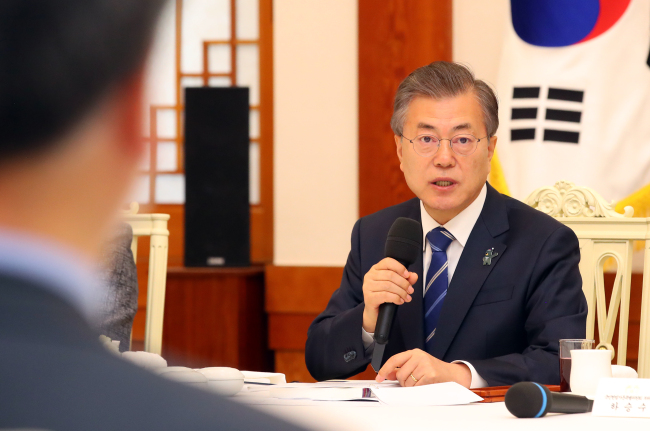President Moon Jae-in on Tuesday emphasized the need to proceed with revising the Constitution on schedule, highlighting the benefits of the timeline proposed by his administration.
Speaking at a meeting with the special committee on constitutional revision, Moon also stressed that he stands to gain no political benefits from the proposed changes.
“If a four-year consecutive term system is adopted, it takes effect from the next president. I want that made clear, as there are misunderstandings that I gain political advantages,” Moon said, adding that such misunderstandings are being propagated by some.
 |
President Moon Jae-in attends a meeting with the special committee on revising the Constitution at the presidential office on Tuesday. Yonhap |
Saying that the three major elections -- presidential, general and local elections -- held during a president’s term drain the country’s resources, Moon went on to emphasize the need to hold a referendum on the issue concurrently with the June 13 local elections.
“If the Constitution is revised, central and local administrations are launched together, and a political system in which the general elections can serve as a mid-term assessment can be established.”
Earlier in the day, a high-level Cheong Wa Dae official revealed that the presidential office plans to submit its own revision bill sometime next week, should the rival parties fail to reach an agreement on related issues.
The official, however, said that the government would withdraw its proposal if the parliament is able to propose its own bill in time. The parliament requires up to 60 days to deliberate on the bill, putting the deadline at the end of March if it is to be put to a vote on June 13.
Moon’s comments came hours ahead of the special committee’s announcement regarding its draft revision.
The draft submitted by the committee suggests changes to allow a president to serve two consecutive four-year terms. Under the proposed revision, a president can run for a second term, but is unable to rerun should the incumbent president lose in the election held at the end of the first term.
Under the current law, a president cannot run for re-election at the end of the five-year term in office.
The committee also suggests adding an article stating that the capital of the country is determined according to related regulations, instead of specifying the capital in the Constitution.
Although Seoul is not defined as the capital in the current Constitution, the Constitutional Court ruled in 2004 that Seoul is recognized as the capital according to the customary Constitution.
Despite the special committee having completed its draft, and Moon taking steps to press the parliament, the ruling Democratic Party and conservative opposition parties remain at loggerheads over the issue.
“There is little time for constitutional revision, so the National Assembly must propose a bill agreed to (by the parties). This is what the people demand of the National Assembly,” the ruling party’s Floor Leader Rep. Woo Won-shik said at a meeting with counterparts from the main opposition Liberty Korea Party and the minor conservative Bareun Future Party.
Rep. Kim Sung-tae of the Liberty Korea Party hit back, accusing Moon of attempting to sway the issue, adding that a revision bill must be drawn up by the parliament.
By Choi He-suk (
cheesuk@heraldcorp.com)






![[Herald Interview] 'Trump will use tariffs as first line of defense for American manufacturing'](http://res.heraldm.com/phpwas/restmb_idxmake.php?idx=644&simg=/content/image/2024/11/26/20241126050017_0.jpg)
![[Exclusive] Hyundai Mobis eyes closer ties with BYD](http://res.heraldm.com/phpwas/restmb_idxmake.php?idx=644&simg=/content/image/2024/11/25/20241125050044_0.jpg)
